MANZANAR…..THOUSANDS OF NAMES
Before coming to Lone Pine the word Manzanar didn’t mean anything to us. In fact, the first time we ran across the name was on a roadside sign a couple days ago north of Lone Pine. We had missed a left turn in town while looking for the Tuttle campground & ended up driving a few miles north of town. A Government type sign said Manzanar National Historic Site half a mile ahead. We used the turn to get ourselves back on track for Lone Pine. I remember glancing to my right & seeing a bunch of cars in a parking lot outside a large building that looked like an Airplane hanger. No idea what it was all about then, but by the end of today we knew very well what it was all about.
We pulled into the large parking of the MANZANAR HISTORICAL SITE about 11:35 this morning & headed for a large building. I noticed the wide concrete sidewalks seemed fairly new & attention had been paid to disabled parking & a concrete ramp into the building. We just made it in time to see a 25 minute film about what happened to the thousands of Japanese American people after America entered into war with Japan following the Japanese attack on Pearl Harbor December 7th, 1941. Kelly & I were the only one’s in the theater.
I won’t go into the history of this historic site because you can get all that from the Manzanar link. But, I can tell you a bit about the interpretive center itself.
Upon entering the original large Auditorium built by internees in 1944 I was immediately aware of voices. Couldn’t quite pinpoint the voices but I could hear muffled voices like people talking. I could hear the sound of children coming from somewhere. I figured a bus tour was in progress somewhere ahead of me amongst the many exhibits. Yet, as I walked further into the center I did not see anyone. But, there just seemed to be many voices in the air.
Took me a few minutes to realize that it was the many voices of recorded people coming from the various displays themselves. It was the sound of the Japanese people talking of their experiences before, during, & after their internment in the camp. Stories of sadness & frustration. Stories of hope & determination.
This is a well laid out interpretive center with many photographs & artifacts. And it is all laid out on the old Auditorium floor complete with the original stage at one end of the building. I particularly noticed the lighting on the exhibits. Having worked in an Art Gallery in Stratford Ontario back in the early nineties I have a wee bit of lighting experience under my belt so I always notice how exhibits are set up & lit.
I especially liked the large panels suspended from the ceiling in one section with all the names of people who once lived in America’s largest Japanese/American internment camp. Upwards of 120,000 people crammed in long wooden buildings on just 814 acres of dry land…..& they had to call it home.
We spent over an hour in the interpretive center & then spent another hour on a driving tour of the grounds. At first glance there isn’t much to see where the camp once stood. Not much that is until you start looking closer. A cement slab here, an old bent water pipe jutting out of the ground there & a lot of curious square cement blocks. Wooden sign posts along the way said Block 12 or 21 or 2. These are the locations of close to a thousand buildings long since been dismantled & taken away. But, we did see two buildings under construction to replicate the original buildings that housed the people. And, we think there is a third cookhouse type building being constructed as well.
THIS STONE WALKWAY ONCE LED TO THE CAMP’S HOSPITAL
Noticed in the film we watched the Japanese people had tended gardens, planted an apple orchard & built about a dozen beautiful Japanese flower & water gardens. We found some of those gardens today. As with so many things in history there wasn’t much left of the once beautiful gardens. All the plants, flowers & trees are long gone but the rock lined concrete ponds, spillways & tiny waterfalls still remain. But, no water has flowed over those dusty rocks since the last of the Japanese people left at the end of the war. Always sad to see crumbling ruins where there once was life & laughter.
THESE WERE ONCE THE HOSPITAL’S JAPANESE GARDENS
More wooden signs told us where the Apple Orchard was, the hospital, nurses quarters, the laundry & heating building. And then we saw a sign that said Cemetery. Only a few remains are left here but it is a Sacred Place for the Japanese people. The Cemetery was actually located just outside of the camp because the Japanese people did not want their remains interred within the camp boundaries itself.
We stopped & looked at a large slab of broken cement where a building once stood that housed weaving machines. Camp residents worked here making camouflage netting for the war effort. Just beyond that we passed out of the camp’s old stone gates, said good-bye to the spirits of Manzanar & headed ourselves home.
We had planned to do the ‘Movie Road’ tour today but Kelly knew she would have a lot of Deer Park Lodge work waiting for her so we headed back to the rig & called it a day. Just another fine one alongside the snow capped Sierra Nevada Mountains.
GROANER’S CORNER:(( Be careful never to let a blonde have a long coffee break... It takes too long to retrain her afterwards!
--------------------------------------------------------------
EMAIL THE BAYFIELD BUNCH:))
stargeezerguy@gmail.com
BISBEE PHOTO ALBUM
http://picasaweb.google.com/stargeezerguy/BISBEEARIZONAAFEWFINEPHOTOMEMORIES
Tourists see the world, travelers experience it.
BLOGGER WEBSITE http://thebayfieldbunch.com/
OUR PHOTO ALBUMS http://picasaweb.google.com/stargeezerguy/
The pessimist complains about the wind; the optimist expects it to change; the realist adjusts the sails -William Arthur Ward
The only thing better than right now will someday be the memories of right now...... AL.
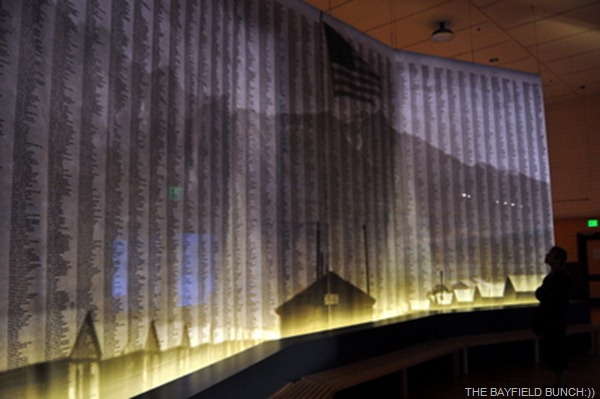


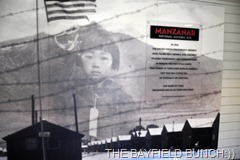
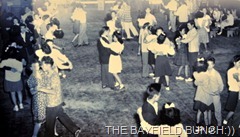
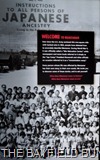


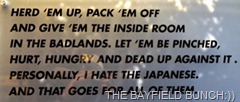




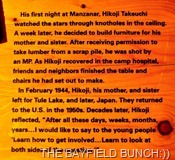
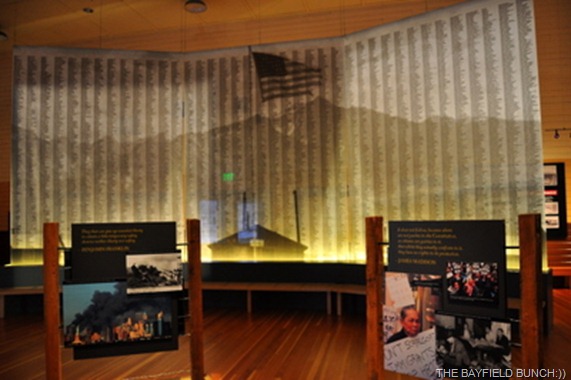



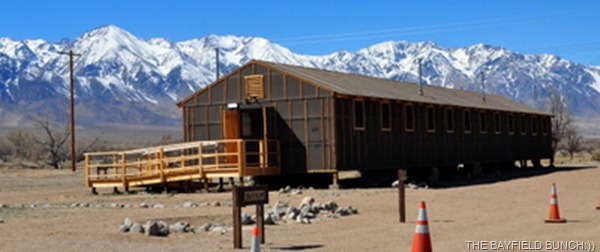

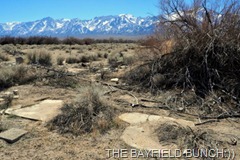
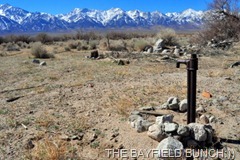


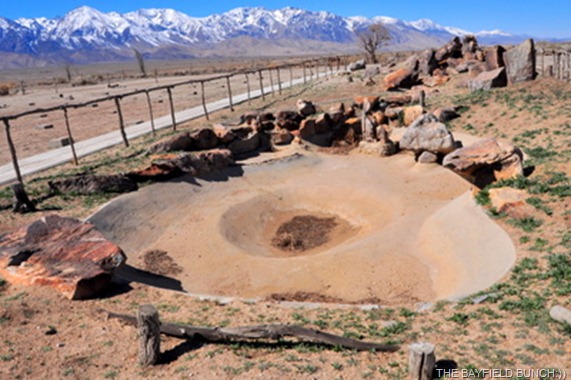

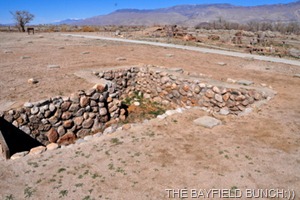
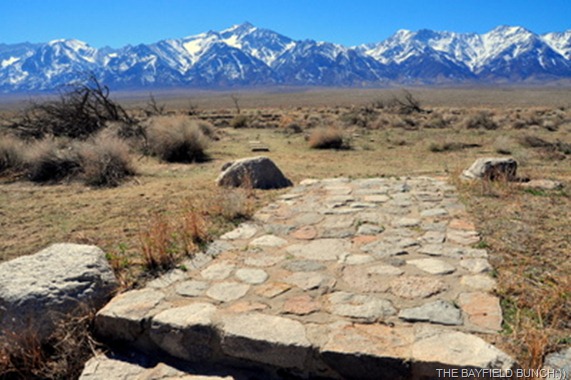
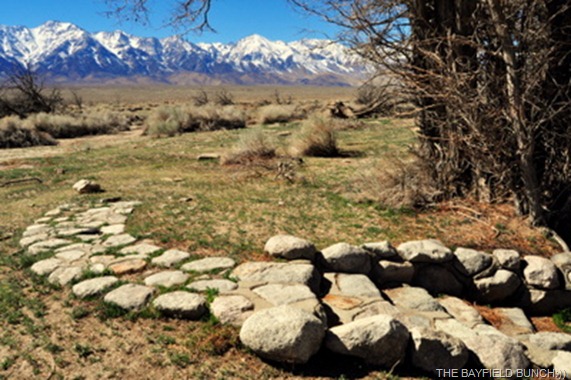
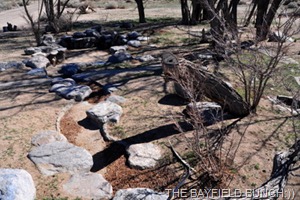






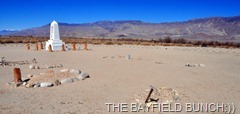
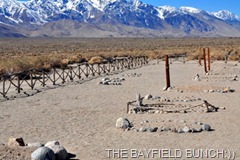
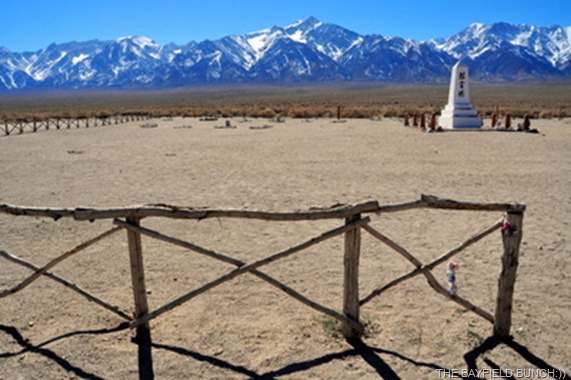



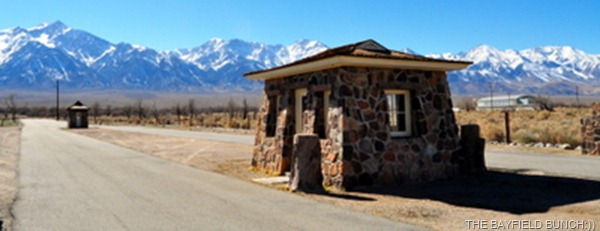

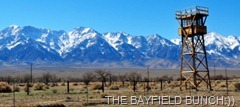
Sad reminder of that time. Nicely narrated visit, Al.
ReplyDeleteEmjay
We went to the Heart Mountain Relocation Camp outside of Cody, WY. Not much left but they were working on a visitor's center that I would like to go back to. Such a sad time in our history. And such very courageous people. They are really going to need to call upon that courage now.
ReplyDeleteAl, thank you so much for an interesting, informative, and forthright blog on this subject. The pictures you took so enhanced the story in the blog.
ReplyDeleteThe smithsonian in Washington, DC had an exhibit several years back, with a recreation of the living quarters. Many japanese who were in the camp said it was an accurate model of how things were. They certainly lived in cramped quarters!
One of the best photos i've ever seen is one you may have noticed when you were there, It's of a very old man and a very young child with tags hanging on their coats. They were tagged like cattle!
Nice Blog Al, enjoyed it. I was just a boy of 5-6 years old during all that, but I kinda remember it. Love the new hjeader picture,,,NEAT!!
ReplyDeleteI lived near the Heart Mountain Relocation Camp near Powell, WY before I married Michael--very moving to walk around these old camps and relive an embarrassing moment in US history!
ReplyDeleteWe toured what was at Manzanar in 2002. If we even saw the auditorium, it was just another ancient closed building. Just a few of those "Camp 21" type signs and the old foundations, etc. We are now planning our late Spring trip, and will probably go along 395 on our way to Carson City to pay respects to the good American citizens we locked up there for so long.
ReplyDeleteThanks for agreeing with our suggestion for the header picture, but I'll bet you had that in mind anyway!
I have heard of this site, after reading your write up, we will have to see it.
ReplyDeleteThanks for the very interesting & GREAT post! I hadn't heard of that place either but I did know about the encampment of the Japanese...I just didn't know where it was. Thanks again!!!
ReplyDeleteHave fun & travel safe
Donna
Thank you so much for enlightening me. I was still a school girl in London, England, when all that was happening, so I never knew the real story.
ReplyDeleteThe atrocities of war! The persecution of the Native Indians, Jews, Japanese and many others. How can man be so cruel to another human being?
Happy Trails, Penny, TX